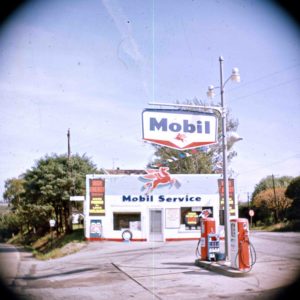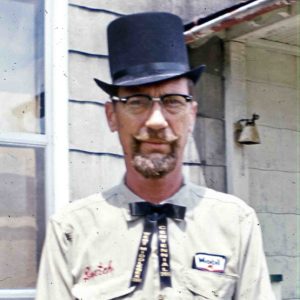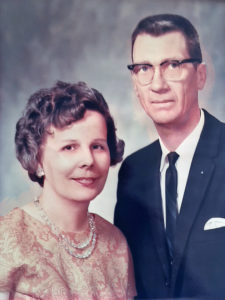Hawg Jaw. Burf. Whizzer. Will. Badger. Smiley. Buster. Chubby. Rip. Al. Stovepipe. New York City. Jake. Spike. Major. Screwy Louie. Rusty.
Those were nicknames of some of the regulars, semi-regulars, and irregulars who hung out at Davis Service & Grocery at the  top of the viaduct in West Middlesex.
top of the viaduct in West Middlesex.
It was quite an unforgettable group whose tales in the 1950s, 60s, 70s, and 80s provided decades of enjoyment and a lifetime of fond memories. Many other taletellers appeared less frequently as customers, neighbors, or anyone wanting to help solve the world’s problems.
The tales were sometimes long, sometimes short, sometimes tall, sometimes Empire State Building tall, but usually interesting or at least semi-humorous. If not a stimulating teller-of-stories on a particular visit, that person usually clammed up and listened for the duration.
I remember stories of sports, neighborhood activities, town events, local characters, hunting and fishing escapades, cars, and what guy around town was hot on the trail of what girl. The weather was rarely mentioned, as everyone knew they could do nothing about it.
 My dad, Dale, was tagged with the nickname Dutch while growing up during the 1920s and 30s in Sharpsville. Young Dale earned Dutch from the term “in dutch,” slang in those days for “in trouble,” or at least “in trouble” a few times, according to his parents and two younger sisters.
My dad, Dale, was tagged with the nickname Dutch while growing up during the 1920s and 30s in Sharpsville. Young Dale earned Dutch from the term “in dutch,” slang in those days for “in trouble,” or at least “in trouble” a few times, according to his parents and two younger sisters.
While he steadfastly denied any “troublemaking,” Dutch remained his handle for a lifetime. Few knew him as Dale.
My mother, Helen, was sometimes referred to as Sarge from her fondness for giving orders, and Bubbles from borough police officer, Norm Keiser, when he and Helen joked and poked about each other’s physique. My uncle, John Kushner, Helen’s brother who lived with us and frequently helped out at the store until he died in 1967, was tagged Unk.
officer, Norm Keiser, when he and Helen joked and poked about each other’s physique. My uncle, John Kushner, Helen’s brother who lived with us and frequently helped out at the store until he died in 1967, was tagged Unk.
Yes, some nicknames required less creativity than others.
Brother Robert, became Bob, occasionally Bobby. My given name of Richard paved the way to Dick. I heard all the substitutions for “Dick” by the time I was 10. With Bob and most of his guy pals being seven years older than me, and the regulars being 15-30 years older, I was on the receiving end of many variations of “dick.”
I didn’t have to stray from the family business to learn fascinating new words and phrases every day. My vocabulary expanded exponentially when I mixed those homegrown words with what I was learning in West Middlesex schools and later at Penn State University.
Today’s PC Language Police would make hundreds of arrests. But we all somehow managed to survive quite well, thank you very much.
Burf was Bill Foulk. Whizzer was Bill White. Will was William Fair. Badger was John Badger, Mercer County’s fulltime game warden. The three Bills were part-time deputies with other fulltime jobs.
Smiley, Buster, and Chubby were the Ruffo brothers. Rip and Al were the Reed brothers. The brothers chatted, worked on their cars, played catch outside, or all three at the same time.
Stovepipe was Dave Palmer, Big Red basketball legend who, you guessed it, happened to be tall and thin. New York City was Steve Michalik, ex-Marine and native of the Bronx, a borough of New York City. Hawg Jaw was Bill Stambaugh, a burly crane operator.
Occasional malapropisms were a New York City contribution. When known only as a football star, O.J. Simpson somehow morphed to O.J. Simpkins, according to NYC. Movie stars Angie Dickinson became Ann Dickson and Raquel Welsh was Rachel Walsh.
While close captioning may have clarified those conversations, the name mangling always led to head-scratching feedback for interpretation. And laughter.
Kidney stones popped up as a topic one day in the 80s. Recollections of parts of that discussion returned clearly two years ago when dealing with a pencil-tip sized demon stone that I couldn’t pass on my own.
After a month’s mystery absence from the store, Mr. X returned looking like half of his former self. Gaunt and pale, he described a horrific battle with kidney stones. Mr. X said the pain had him rolling on the floor, crawling walls, and hardly eating or drinking.
(I use Mr. X as I don’t recall who it was and don’t want to wrongly attribute. But nasty medical details are vivid.)
Hmm. While we could clearly see the results of X’s losing fight, I also assumed he was exaggerating, if only a little. After all, I heard tons of fish-and-game stories over the years where guys caught, shot or trapped world-record specimens. In reality, the “records” were exaggerations to make stories more interesting.
Turns out, Mr. X was right on the money. I learned the hard way when my screaming stone appeared and demanded several surgical procedures. The demon was more painful than watching Congress “in action.”
Jake, Spike, and Major were the Scott brothers, Dutch’s lifelong friends from Sharpsville. They popped in when their trucking business had them in the area. The Scotts always provided several jokes and tales from the past.
I was thrilled to hear that growing up Dutch had an extremely adventurous life. It provided new insights and perspectives on my dad.
Screwy Louie was Louie, our longtime Keystone Bread deliveryman. Rusty was our regular deliverer of Rust’s Milk. (As I said before, some nicknames required less creativity than others.) Both carried in their products and a tale or two, usually tall.
Helen’s women friends through the West Middlesex chapter of The Degree of Honor Protective Association stopped by infrequently. Chapter business was conducted in a member’s home, local church or the VFW. Helen sold hundreds of insurance policies and held numerous state and national offices from the early 50s through 2008 for the association.
Davis Service & Grocery at the top of the viaduct ran from 1950 through 1992. It might still be running were it on Broadway. (Broadway in Manhattan, not Broadway in nearby Wheatland and Farrell) Its cast of characters was authentic, not from a blowhard playwright.
Dutch and Helen started a service station with gasoline, oil, air compressor, basic engine and tire repairs, groceries, tobacco products, and candy. The mid 60s brought hunting, fishing licenses, some sporting goods, apparel, bait, and ammunition. The garage for engine repairs in the rear of the building was remodeled to a two-bedroom apartment in the late 60s.
Dutch had a story for everyone. Customers stopped in for a service or product, paid their money, and got a story or ten from Dutch at no extra charge. Depending on business, Dutch could spin a tale of any duration. Some neighbors ran in for cold milk then yakked with Dutch as their milk cooled on the counter.
It was a hub of activity at the bustling intersection of Main Street (Rt. 318), Penn Avenue, Wheatland and Bedford roads in the borough. The intersection had more than its share of vehicle accidents over the years but PennDOT never deemed it busy enough for a traffic light. Despite a few fatalities, some near fatalities, many fender-benders, and several traffic-count studies, nary a stoplight or blinking light appeared.
I would use the word idiotic with PennDOT but that would be redundant.
Seventy years later, the business, Dutch and Helen, and most of the regulars are gone. Gasoline pumps, underground storage tanks, and signage were removed in 1993. The white, cement-block building that hosted countless stories of life remains on the corner and home to a new family since a 2012 sale.
I wonder if the new family encounters any spirits of stories past. I wonder if kidney stones are whispered or bounced from walls.
The intersection remains traffic light free. Some things change. Some things never change.